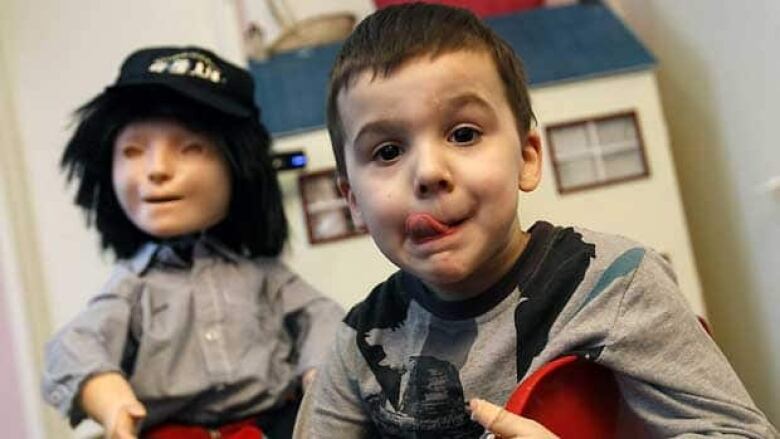Autism checklist spots warning signs in infants

The signs of autism may be present as early as one year of age, and a simple checklist could help doctors screen for it, researchers say.
Babies who are not socially engaged, gesturingor babbling may raise flags for parents and family doctors.
In Thursday's issue of the Journal of Pediatrics, researchers in San Diego describe the testing of a screening checklist designed to find language or developmental delays, conducted on 10,479 babies.
The screening uses a 24-question checklist that can be easily understood and answered by parents in about five minutes.
Early autism warning signs
- Lack of"shared attention." Around age one, babies should try to "pull your attention into their world," pointing to a bird and watching to see if you look, for example, or bringing you a toy.
- Lack of shared enjoyment, where a baby may smile at mom but not engage if other people try peek-a-boo.
- Repetitive behaviours such as spinning a car wheel rather than playing with the toy.
- Language delays are worrisome if they accompany other problem signs, Pierce said. "If they wave and they point, that's a good sign the brain is readying itself to be ready to speak."
Neuroscientist Karen Pierce of the University of California, San Diego, led the study of 137 pediatricians who used the questionnaire during one-year checkups and referred babies who failed for further testing. Children were re-evaluated every six months to age three when diagnosis is more certain.
Of the babies who were screened, 1,318 failed. Next, 346 of these babies were referred for more testing, and 32 eventually received a diagnosis of autism, language delay or developmental delay.
It's unclear why 972 children who failed were never referred for followup. It's possible therewere errors in records, the doctors and parents weren't worried enough to follow up right away, or the families went elsewhere to be evaluated.
"The screen just says something is wrong it doesn't tell you what is wrong," said Pierce. The screen "doesn't tell you what you should do."
The screening accurately predicted a problem in 75 per cent of the children referred.
It's hoped that by spotting problems sooner, children can start receiving interventions earlier.
"You are now saying to a family, 'Your child is showing early warning signs at 12 months.' If you don't have anything to give them in terms of treatment and intervention, you're setting them up for significant anxiety," said Suzanne Lanthier, executive director of Autism Speaks Canada, whose 11-year-old son has autism and is getting treatment.
The researchers say future studies should validate and refine the screening tool, track children until a much older age and assess barriers to treatment.
Thestudy wasfunded by the U.S. National Institute of MentalHealthAutism Center of Excellence,Autism Speaks, and the Organization for Autism Research.
With files from CBC's Kelly Crowe and The Associated Press












_(720p).jpg)


 OFFICIAL HD MUSIC VIDEO.jpg)
.jpg)



























































































